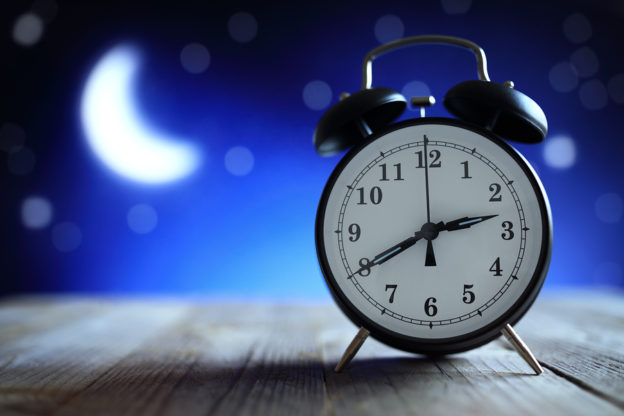By David Blyweiss, M.D., Advanced Natural Wellness
November 3, 2017
- Your internal clock does more than regulate sleep
- Mysterious ways your body clock affects your health
- 6 ways to synchronize your natural circadian rhythm
When you think about your “body clock”, it’s likely that the only thing you associate it with is your sleep schedule. But what if I told that your “clock” is running in every cell of your body, every single day minute of the day?
It’s true. In fact, three scientists who contributed to this discovery recently received the Nobel Prize for it. And it’s well deserved.
It turns out that our circadian rhythm is critical to much more than our sleeping habits. Any mismatch between our lifestyle and our internal clock can affect any number of biological processes.
In the short-term you might find yourself feeling fuzzy, forgetful and out of sorts. You might even feel hungrier than usual… craving sweets and carbs.
MD Exposes the Hidden Danger to Your Eyes

When your eyesight starts to fail, it's a real problem. Suddenly you can't go to the grocery store... you can't get to the doctor if you have an emergency... you can't meet your friends for dinner…
Your "regular" doctor doesn't have time to keep up with the latest research. And the same goes for eye doctors. They go to school to learn how to fit you for glasses and contacts, but have no way of preventing the damage and loss of eyesight that threatens your freedom and independence.
Let me show you something that explains a LOT about how your eyes work.
In my FREE Special Report, I'll show you a HUGE, untapped resource for your eyes that safely and naturally restores clear, effortless eyesight.
Click here to get started...
But in the long-term?
It will definitely take a toll on your health – especially if you tend to live “out of synch” with your natural circadian rhythm.
You may not notice it right off the bat. But when the time-clock in your body isn’t in alignment with your natural circadian rhythm, bad things happen. Among other things, this includes an increased risk of heart disease, type 2 diabetes and cancer.
Mysterious Ways Your Body Clock Affects Your Health
Your body temperature, blood pressure, heart beat, energy levels, metabolism and hormones are all aligned with your daily rhythm.
For example, your blood pressure fluctuates over a 24-hour cycle – dropping to its lowest point at night and peaking at mid-morning.
However, just a short-term misalignment of your circadian rhythm interferes with that night-time dip in blood pressure. Instead, it could actually increase your sleeping blood pressure by about 5.6 points on the top number (systolic) and 1.9 on the bottom (diastolic). This can result in higher blood during wake periods, too.
The World's Quickest Solution for Ending Prostate and Urinary Misery
This has recently been revealed to be one of the only real breakthroughs in prostate health.
The seeds of a strange fruit (sometimes called "Chinese Apples") hold powerful phytonutrients that are a revolution in prostate health.
In fact, UCLA and Veterans Administration research have now proved this to be true.
Not only that, but it may be the worlds quickest solution for ending prostate misery.
Simply stated, these phytonutrients represent a huge step beyond beta sitosterol, saw palmetto, and other phytosterols alone.
Simply click HERE if you want to have fast prostate relief...restful, uninterrupted sleep...no more constant "urges to go"...enhanced virility...and optimal prostate support for life.
When your internal clock gets out of whack it also increases certain inflammatory markers associated with heart disease and poor health. Interleukin-6 (IL-6) and C-reactive protein (CRP) are that you may be familiar with.
CRP is a strong predictor of a first-time heart attack. And both are linked to cancer, Alzheimer’s, stroke and other inflammatory diseases.
Living “off your clock” also wreaks havoc on your hormones. It results in unscheduled secretion of insulin and increases markers of insulin resistance. It disrupts the production of your stress hormone, cortisol. Hunger hormones like leptin and ghrelin get thrown out of balance.
All in all, when you are not in synch with your natural cycle, your body simply can’t deal with it. Everything goes haywire. And it stays that way until you bring balance back to your inner time clock.
The critical message for you is this:
It’s Time to Synchronize Your Natural Circadian Rhythm
Your natural circadian rhythm synchronizes changes in gene expression that affect every aspect of your life. This includes your sleeping patterns, eating habits, energy levels, memory and behavior. It’s also what tells your heart and other organs how to adapt to all of the demands of the day.
When it’s not in alignment with its natural cycle, none of these needs can be met. As a result, maintaining healthy sleeping patterns is absolutely vital to your health.
- When you wake up in the morning, seek light. Open the blinds and curtains. Sit outside while you sip on your tea or coffee. Enjoy breakfast on the patio. The sooner you seek light, the more effect it will have on your natural rhythm.
- Napping feels good while you’re doing it. And just a five or 10 minute snooze can leave you feeling like you’re starting a new day. However, it can also confuse your body and leave you tossing and turning at night. So it’s a good idea to avoid napping during the day whenever possible.
- Eat your meals at the same time every day. Your internal clock knows when it’s time to be fed. If you put your meals off by two, three or four hours it can delay circadian-related metabolic processes by the same amount.
- Avoid caffeinated beverages after lunchtime. You may think you’re immune to their stimulating effects… but that’s just wishful thinking.
- Make your bedroom a sleep oasis. When darkness falls, shut the shades and turn the thermostat down a few degrees. Research has shown that 63-65 degrees Fahrenheit (really) is optimal for restful sleep…throw on an extra blanket if need be. You can fiddle around with your cell phone or tablet for awhile… maybe watch a little TV. But shut all of these blue light emitting devices down a good half hour or 45 minutes before you want to fall asleep.
- Go to sleep and wake up as close to the same time every day.
- Other than dietary/lifestyle changes, consistent sleep patterns are one of the most critical elements you can control to take your health back.
SOURCES:
The 2017 Nobel Prize in Physiology or Medicine. Press Release. Nobelprize.org. Nobel Media AB 2014. Web. 5 Oct 2017.
Morris CJ, et al. Circadian misalignment increases cardiovascular disease risk factors in humans. PNAS. 2016 Mar; 113(10).
Zhang L, et. Al. Circadian rhythm and cardiovascular disorders. ChronoPhysiology and Therapy. 2014 Jul; 2014(4):27-40.
Gnocchi D, et al. Circadian Rhythms and Hormonal Homeostasis: Pathophysiological Implications. Biology (Basel). 2017 Mar; 6(1):10.
Wehrens SMT, et al. Meal Timing Regulates the Human Circadian System. Curr Biol. 2017 Jun 19;27(12):1768-1775.e3.







